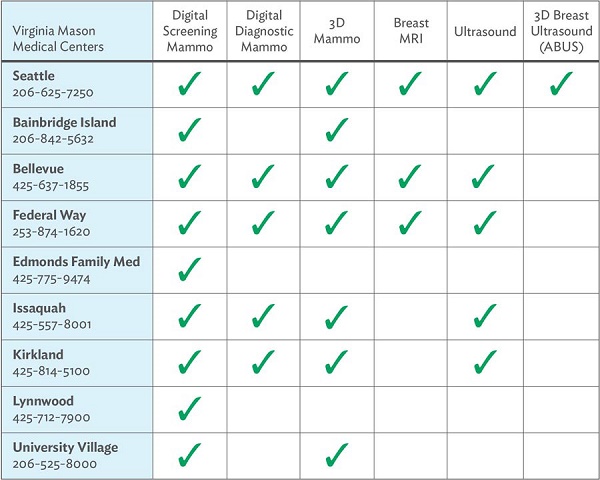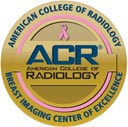It’s a matter of saving lives.
Early detection is key
A screening mammogram is the best way to detect breast cancer early. The earlier cancer is detected, the greater the chance it can be treated successfully.
Begin at age 40
The Virginia Mason Breast Center recommends these screening guidelines: for women who are not at high risk of developing breast cancer:
- Yearly screening mammogram for women age 40 and older
- Yearly clinical breast exam
Mammography is the only screening tool proven to reduce the rate of death from breast cancer and has helped bring down breast cancer mortality rates by more than one-third since 1990. The American Cancer Society, the United States Preventive Services Task Force, and the American College of Radiology all agree that screening each year starting at age 40 will save the most lives. The American College of Radiology, the National Comprehensive Cancer Network, the American College of Surgeons and the American College of Obstetrics and Gynecology all recommend that women get an annual mammogram starting at 40 and continue as long as they are in good health.
Getting a Mammogram: Why the Conflicting Recommendations?
By Peter R. Eby, MD, FSBI
Schedule your mammogram today – right in your own neighborhood.
Screening mammograms are available at all of Virginia Mason's regional medical centers throughout Puget Sound. There’s no need for a physician referral, and they can often be scheduled for the same day.
To schedule a screening mammogram at any Virginia Mason location, please call (206) 341-1700 or toll-free at (877) 433-9813.
Find your nearest location.

For other breast-health concerns, contact our breast care team toll-free at (877) 433-9813.
What about monthly breast exams?
Some women choose to do monthly breast exams, but there is no evidence that self-exams are beneficial in the long run so do not be concerned if you feel uncomfortable checking your own breasts. Self-exams can, however, help you become more aware of how your breasts normally look and feel.
What is a mammogram?
A screening mammogram is done to detect cancer before it can be felt during a breast exam and before there are any symptoms. This type of X-ray is performed by a mammography technologist using a special machine that compresses and flattens the breast for a short time during which two X-ray views of the breast are taken. One view looks at the breast from top to bottom and the other from side to side.
If you have a breast lump or other concern, you may have a diagnostic mammogram. This type of X-ray focuses on a particular area of your breast and can help a radiologist (a doctor who specializes in reading X-ray images) determine whether a breast lump is normal tissue, a harmless cyst or a potentially cancerous tumor.

It is essential to your good health and well-being that you get a high-quality mammogram and an accurate interpretation of that image. Some factors that may affect accuracy are the experience of the radiologist reading your mammogram, the expertise of the mammography technologist who performs your exam and whether the facility you choose has the latest technology in breast imaging. Virginia Mason provides patients with experienced radiologists and technologists and has the best mammography options available. These include computer-aided detection, digital 3D mammography (tomosynthesis) and breast MRI. Virginia Mason is certified as a Breast Center of Excellence by the American College of Radiology.
Computer Aided Detection (CAD) digitally scans a mammogram and identifies areas of concern for the radiologist to review. Studies show that the use of CAD may increase the detection rate of cancer.
Digital Breast Tomosynthesis (also known as 3D Mammography) helps radiologists better distinguish between normal and abnormal breast tissue by creating multiple images of different layers of the breast. Tomosynthesis is of greatest benefit to women with dense breast tissue or for women having their first mammogram. Please refer to the chart above to find a location near you.
Breast MRI can be used for screening women who are at higher than average risk of getting breast cancer. This includes women who have a strong family history of breast cancer or women who have a genetic mutation such as BRCA1 or BRCA2. Breast MRI is also used in women who have just been diagnosed with breast cancer to see if there are any other abnormal spots in either breast or any suspicious-looking lymph nodes.